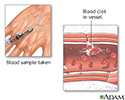Factor XII (Hageman factor) deficiency
F12 deficiency; Hageman factor deficiency; Hageman trait; HAF deficiencyFactor XII deficiency is an inherited disorder that affects a protein (factor XII) involved in blood clotting.
Causes
When you bleed, a series of reactions take place in the body that helps blood clots form. This process is called the coagulation cascade. It involves special proteins called coagulation or clotting factors. You may have a higher chance of excess bleeding if one or more of these factors are missing or are not functioning as they should.
Factor XII is one such factor. A lack of this factor does not cause you to bleed abnormally. But, the blood takes longer than normal to clot in a test tube.
Factor XII deficiency is a rare inherited disorder.
Symptoms
There are usually no symptoms.
Exams and Tests
Factor XII deficiency is most often found when clotting tests are done for routine screening.
Tests may include:
- Factor XII assay to measure the activity of factor XII
Factor XII assay
The factor XII assay is a blood test to measure the activity of factor XII. This is one of the proteins in the body that helps the blood clot....
Read Article Now Book Mark Article - Partial thromboplastin time (PTT) to check how long it takes for blood to clot
PTT
Partial thromboplastin time (PTT) is a blood test that looks at how long it takes for blood to clot. It can help tell if you have a bleeding problem...
 ImageRead Article Now Book Mark Article
ImageRead Article Now Book Mark Article - Mixing study, a special PTT test to confirm factor XII deficiency
Treatment
Treatment is usually not needed.
Support Groups
More information and support for people with factor XII deficiency and their families can be found at:
- National Hemophilia Foundation -- www.hemophilia.org/bleeding-disorders-a-z/types/other-factor-deficiencies/factor-xii
- National Organization for Rare Disorders -- rarediseases.org/rare-diseases/factor-xii-deficiency/
- NIH Genetic and Rare Diseases Information Center -- rarediseases.info.nih.gov/diseases/6558/factor-xii-deficiency
Outlook (Prognosis)
The outcome is expected to be good without treatment.
Possible Complications
There are usually no complications.
When to Contact a Medical Professional
The health care provider usually discovers this condition when running other lab tests.
Prevention
This is an inherited disorder. There is no known way to prevent it.
References
Gailani D, Benjamin TF, Wheeler AP. Rare coagulation factor deficiencies. In: Hoffman R, Benz EJ, Silberstein LE, et al, eds. Hematology: Basic Principles and Practice. 8th ed. Philadelphia, PA: Elsevier; 2023:chap 135.
Hall JE, Hall ME. Hemostasis and blood coagulation. In: Hall JE, Hall ME, eds. Guyton and Hall Textbook of Medical Physiology. 14th ed. Philadelphia, PA: Elsevier; 2021:chap 37.
Ragni MV. Hemorrhagic disorders: coagulation factor deficiencies. In: Goldman L, Schafer AI, eds. Goldman-Cecil Medicine. 26th ed. Philadelphia, PA: Elsevier; 2020:chap 165.
Review Date: 2/2/2023
Reviewed By: Mark Levin, MD, Hematologist and Oncologist, Monsey, NY. Review provided by VeriMed Healthcare Network. Also reviewed by David C. Dugdale, MD, Medical Director, Brenda Conaway, Editorial Director, and the A.D.A.M. Editorial team.


